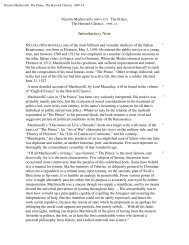Notre Dame de Paris - Bartleby.com
Notre Dame de Paris - Bartleby.com
Notre Dame de Paris - Bartleby.com
You also want an ePaper? Increase the reach of your titles
YUMPU automatically turns print PDFs into web optimized ePapers that Google loves.
The cell was small, wi<strong>de</strong>r than it was <strong>de</strong>ep, with a vaulted, Gothic ceiling, giving it much the aspect of<br />
the insi<strong>de</strong> of a bishop’s mitre. Upon the bare flag-stones which formed its floor, in a corner a woman was<br />
seated, or rather crouching, her chin resting on her knees, which her tightly clasped arms pressed close<br />
against her breast. Cowering together thus, clothed in a brown sack which enveloped her entirely in its<br />
large folds, her long, gray hair thrown forward and falling over her face along her si<strong>de</strong>s and down to her<br />
feet, she seemed, at the first glance, but a shapeless heap against the gloomy background of the cell, a<br />
dark triangle which the daylight struggling through the window divi<strong>de</strong>d sharply into two halves, one<br />
light, the other dark—one of those spectres, half light, half sha<strong>de</strong>, such as one sees in dreams, or in one<br />
of Goya’s extraordinary works—pale, motionless, sinister, crouching on a tomb or leaning against the<br />
bars of a prison. You could not say <strong>de</strong>finitely that it was a woman, a man, a living being of any sort; it<br />
was a figure, a vision in which the real and the imaginary were interwoven like light and shadow.<br />
Beneath the hair that fell all about it to the ground, you could just distinguish the severe outline of an<br />
emaciated face, just catch a glimpse un<strong>de</strong>r the edge of the garment of the extremity of a bare foot,<br />
clinging cramped and rigid to the frozen stones. The little of human form discernible un<strong>de</strong>r that<br />
penitential covering sent a shud<strong>de</strong>r through the behol<strong>de</strong>r.<br />
This figure, which might have been permanently fixed to the stone floor, seemed wholly without<br />
motion, thought, or breath. In that thin covering of sackcloth, in January, lying on the bare stones,<br />
without a fire, in the shadow of a cell whose oblique loophole admitted only the northeast wind, but<br />
never the sunshine, she seemed not to suffer, not even to feel. You would have thought she had turned to<br />
stone with the dungeon, to ice with the season. Her hands were clasped, her eyes fixed; at the first glance<br />
you took her for a spectre; at the second, for a statue.<br />
However, at intervals, her livid lips parted with a breath and quivered, but the movement was as <strong>de</strong>ad<br />
and mechanical as leaves separated by the breeze; while from those dull eyes came a look, ineffable,<br />
<strong>de</strong>ep, grief-stricken, unwavering, immutably fixed on a corner of the cell which was not visible from<br />
without; a gaze which seemed to concentrate all the gloomy thoughts of that agonized soul upon some<br />
mysterious object.<br />
Such was the being who, from her habitation, was called the recluse, and from her sackcloth garment,<br />
the sachette.<br />
The three women—for Gervaise had joined Mahiette and Oudar<strong>de</strong>—looked through the window, and<br />
though their heads intercepted the feeble light of the cell, its miserable tenant seemed unaware of their<br />
scrutiny.<br />
“Let us not disturb her,” whispered Oudar<strong>de</strong>; “she is in one of her ecstasies, she is praying.”<br />
Meanwhile Mahiette gazed in ever-increasing earnestness upon that wan and withered face and that<br />
dishevelled head, and her eyes filled with tears. “That would in<strong>de</strong>ed be strange!” she murmured.<br />
She pushed her head through the cross-bars of the window, and succee<strong>de</strong>d in obtaining a glimpse into<br />
that corner of the cell upon which the unfortunate woman’s eyes were immovably fixed. When she<br />
withdrew her head, her face was bathed in tears.<br />
“What do you call that woman?” she asked of Oudar<strong>de</strong>.<br />
“We call her Sister Gudule,” was the reply.










